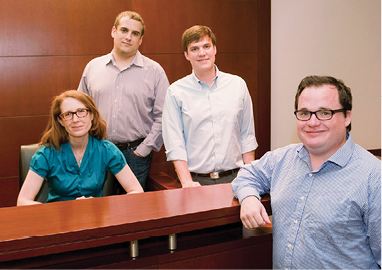
The Vanderbilt Appellate Litigation Clinic established an important precedent in the Sixth Circuit through its representation of a Michigan prisoner in LaFountain v. Harry—that people too poor to pay the filing fee in federal court have the same procedural rights as those who can pay.
Four members of the Class of 2013—Hunter Branstetter, James P. Danly, Tracy Hancock (BS’10) and Seamus Kelly—participated in the clinic’s representation of Wayne Earl LaFountain, an inmate who had alleged that prison officials retaliated against him for filing administrative grievances and successful lawsuits challenging prison conditions. The court in the Eastern District of Michigan dismissed LaFountain’s case with prejudice for failure to state a claim, and he appealed to the U.S. Court of Appeals for the Sixth Circuit.
For the students, the LaFountain case was a yearlong team effort. Kelly, Hancock and Danly briefed the case, and in March 2013, Kelly argued it to the Sixth Circuit with Branstetter sitting second chair. “Seamus and Hunter spent a snowy spring break in Cincinnati, preparing for argument,” said Alistair Newbern, assistant clinical professor of law, who teaches the appellate clinic. “Happily, their hard work really paid off.”
Kelly found working on the case “the most challenging and rewarding experience of my life. I practiced the argument three times a week for two months while Professor Newbern and Hunter peppered me with questions,” he recalled. “And each night I’d watch a video of the argument and figure out how to answer their questions more succinctly.”
The Sixth Circuit ruled in May 2013 for LaFountain, reversing the district court’s ruling and overturning 1997’s McGore v. Wrigglesworth, a Sixth Circuit case, that addressed the rights of indigent people to file federal cases in light of the Prison Litigation Reform Act of 1996. The act established rules for how prisoners and poor people can bring federal cases without paying the filing fee.
“In McGore, the Sixth Circuit held that if you’re indigent and file a complaint, you can’t amend it to avoid having your case dismissed. That’s a right everybody else has under Rule 15 of the Federal Rules of Civil Procedure,” Newbern said. “Basically, the McGore decision meant that if you’re too poor to pay the filing fee, you don’t get the same procedural rights as everyone else.”
In the 10 years after McGore, similar cases in the 11 other federal circuits were all decided in favor of allowing indigent clients the same rights to amend federal cases as all other litigants. In 2007, the Supreme Court issued a ruling in Jones v. Bock that clearly stated that if the Prison Litigation Reform Act did not specifically change a rule of procedure, normal procedure applied. The clinic team challenged the dismissal of LaFountain’s case by arguing that the Jones ruling invalidated the Sixth Circuit precedent established by McGore.
The impact of the decision was noted by SCOTUSblog’s Amy Howe. “Because the Sixth Circuit’s decision…in LaFountain was a published one, it is now the law of the Sixth Circuit—and means that (the) Burnside (decision) would now prevail there,” Howe commented. “LaFountain was great work by the Vanderbilt Law School’s Appellate Litigation Clinic, spearheaded by Alistair Newbern there.”